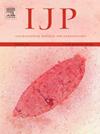Biased availability of genetic data for parasites: it’s all about the host
IF 3.2
2区 医学
Q1 PARASITOLOGY
引用次数: 0
Abstract
Advances in DNA sequencing technology have significantly increased the availability of publicly accessible genetic data across various parasite taxa. This genetic data is crucial for elucidating gene flow, connectivity among parasite populations, cryptic diversity, and resolving parasite phylogenies. However, phylogenetic reconstructions are often hindered by incomplete genetic data across taxa, particularly in less-studied taxa like parasitic helminths. We tested whether the availability of genetic data for helminth species is biased and influenced by which hosts they infect using the largest known helminth life cycle database. We compared helminth species with genetic sequences in the NCBI Nucleotide and Gene databases against those without publicly available sequences. We examined the impact of the number of definitive hosts, their higher taxon, conservation status, and habitat on genetic data availability. Our findings reveal significant biases in existing genetic data for helminth parasites, influenced by host-related factors. Helminth species with more definitive hosts species, hosts of conservation concerns, and/or those with terrestrial hosts are more likely to have genetic data available. These biases in genetic data availability raise concerns for phylogenetic studies, as they suggest that the current genetic knowledge of helminth parasites is neither random nor representative of existing biodiversity. Consequently, phylogenetic trees based on biased data may not accurately capture the true evolutionary relationships among parasite taxa, as well as trends in the evolution of key traits, such as host specificity. Comprehensive and unbiased data collection efforts are needed to improve the accuracy of phylogenetic analyses and our understanding of parasite evolution.

寄生虫遗传数据的可用性存在偏见:这一切都与宿主有关。
DNA测序技术的进步大大增加了各种寄生虫分类群中可公开获取的遗传数据的可用性。这些遗传数据对于阐明基因流动、寄生虫种群间的连通性、隐性多样性和解决寄生虫系统发育问题至关重要。然而,系统发育重建经常受到不同分类群遗传数据不完整的阻碍,特别是在研究较少的分类群中,如寄生蠕虫。我们使用已知最大的蠕虫生命周期数据库,测试了蠕虫物种遗传数据的可用性是否受到它们感染的宿主的影响。我们比较了在NCBI核苷酸和基因数据库中有基因序列的蠕虫物种与没有公开序列的蠕虫物种。我们研究了最终宿主数量、它们的高级分类群、保护状况和栖息地对遗传数据可用性的影响。我们的研究结果表明,受宿主相关因素的影响,现有的寄生虫遗传数据存在显著偏差。具有更明确宿主的蠕虫物种、具有保护意义的宿主和/或具有陆地宿主的蠕虫物种更有可能获得遗传数据。遗传数据可得性方面的这些偏差引起了对系统发育研究的关注,因为它们表明,目前关于蠕虫寄生虫的遗传知识既不是随机的,也不能代表现有的生物多样性。因此,基于有偏差数据的系统发育树可能无法准确地捕捉到寄生虫分类群之间的真正进化关系,以及关键性状(如宿主特异性)的进化趋势。为了提高系统发育分析的准确性和我们对寄生虫进化的理解,需要全面和公正的数据收集工作。
本文章由计算机程序翻译,如有差异,请以英文原文为准。
求助全文
约1分钟内获得全文
求助全文
来源期刊
CiteScore
8.40
自引率
2.50%
发文量
76
审稿时长
23 days
期刊介绍:
International Journal for Parasitology offers authors the option to sponsor nonsubscriber access to their articles on Elsevier electronic publishing platforms. For more information please view our Sponsored Articles page. The International Journal for Parasitology publishes the results of original research in all aspects of basic and applied parasitology, including all the fields covered by its Specialist Editors, and ranging from parasites and host-parasite relationships of intrinsic biological interest to those of social and economic importance in human and veterinary medicine and agriculture.

 求助内容:
求助内容: 应助结果提醒方式:
应助结果提醒方式:


